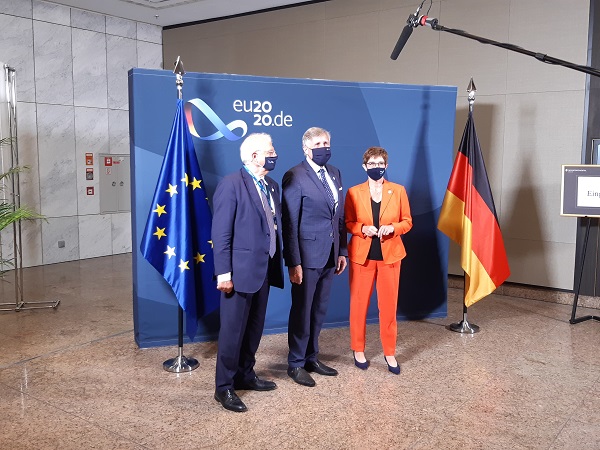 L-R: Josep Borrell Fontelles, High Representative of the EU, Vice-President of European Commission; François Bausch, Luxembourg's Minister of Defence; Annegret Kramp-Karrenbauer, Germany's Minister of Defence;
Credit: MAEE / Directorate of Defence
L-R: Josep Borrell Fontelles, High Representative of the EU, Vice-President of European Commission; François Bausch, Luxembourg's Minister of Defence; Annegret Kramp-Karrenbauer, Germany's Minister of Defence;
Credit: MAEE / Directorate of Defence
Luxembourg's Deputy Prime Minister and Minister of Defence François Bausch has proposed that the European Union (EU) adopt a “Human Rights Due Diligence Policy for all its support and missions abroad.
At the invitation of the German Presidency of the EU Council, Minister François Bausch participated yesterday in the informal meeting of EU defence ministers in Berlin.
In the presence of United Nations (UN) Under-Secretary-General for Peace Operations Jean-Pierre Lacroix and NATO Secretary-General Jens Stoltenberg, the defence ministers discussed strengthening EU training missions in Mali, the Central African Republic and Somalia.
While reiterating the importance of these missions and the efforts undertaken to make them more effective, Minister François Bausch insisted that the capacity building provided by the EU and its Member States to the armed forces of these countries should not be limited to a purely military content, but must also include elements of good governance as well as knowledge of human rights and international humanitarian law.
With regard to the ongoing discussions aimed at setting up a European Peace Facility, which should, among other things, enable the armed forces of these countries to be better equipped, Luxembourg has insisted on taking into account ex-ante independent and transparent analyses, including civil society actors, on respect for human rights by potential beneficiaries, as well as on credible guarantees with regard to secure storage capacities and good management in the event of arms financing.
Luxembourg's Defence Minister also proposed that, like the UN, the EU should adopt a “Human Rights Due Diligence Policy” for all its support and missions abroad.
Regarding the discussions on the EU's future strategic compass, which will include, among other things, a threat analysis (expected at the end of the year), Minister François Bausch has already insisted that this analysis of threats are not limited only to traditional threats, but that more recent threats (such as the risks associated with potential cyber attacks, hybrid threats or the potential geostrategic and security consequences of big environmental changes) also be taken into account.








